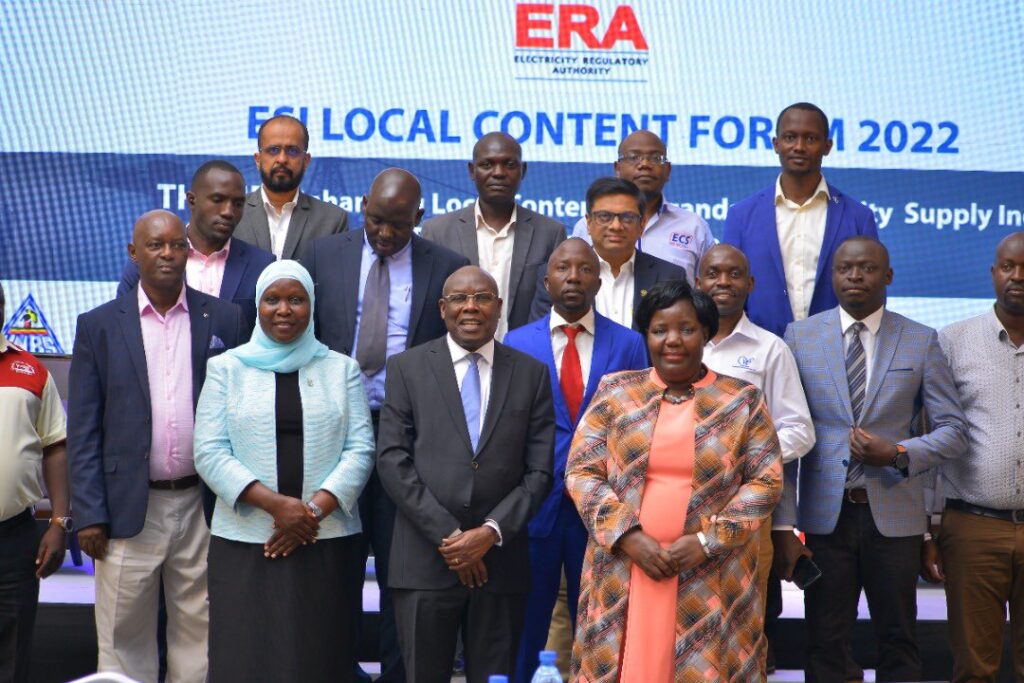The Electricity Regulatory Authority (ERA) has launched the inaugural Forum for local contents within the Electricity Supply Industry (ESI) with the aim to increase uptake of local products and services within the electricity sector for social economic transformation.
“We are looking at three outputs; one we want to quantify, by way of documenting the different products that are on the local market, their quantity, the production capacity, the level of standards, and how we can match it with the standards that we need within the Electricity Supply Industry so that we are able to locally source the materials that we need for construction, for operation and maintenance within the electricity supply industry,” said ERA CEO, Ziria Tibalwa Waako at the launch of the Forum in Kampala on Thursday.
The move by ERA to promote local content in Uganda’s electricity sector is a clear implementation of the country’s Buy Uganda Build Uganda (BUBU) policy which was enacted to promote use of locally manufactured goods and use of local skills/personnel.
Waako said that the move to promote local content within the Electricity Supply Industry is also to make the Sector not fully dominated by the use of dollar which inflates the cost of electricity whenever it appreciates against the Uganda shilling.
“Among the negative impacts that push the tariff up is when the dollar strengthens against the shilling, largely because most of the inputs, the equipment and materials that we have been using for manufacturing are sourced in the international market. But today has been a very successful day for both manufacturers as well as the Electricity Supply Industry that they have enlisted the capability to almost produce most of the inputs that we need for the transmission, for the distribution and for last mile connection within the electricity supply industry. And to some extent also in the generation when it comes to the civil reinforcement, bars, cement. We have been impressed by the level at which our local content has developed,” she said.
However, as the regulator moves to promote local content in the electricity sector, many questions rise as to whether the local suppliers have to the capacity to meet the industry demands, and also supply good quality products.
Waako said that local suppliers are willing to partner with the regulator to continuously improve the quality of their products, as well as invest in research and development to ensure that the players in the sector progressively become innovative to be able to catch up with technological advancement.
“We are not remaining behind as the sector. We are also looking at self healing networks, we are looking at leveraging ICT to improve the reliability of supply.”
The Forum was organized in collaboration with the Public Procurement and Disposal of Public Assets Authority (PPDA), and the Uganda National Bureau of Standards (UNBS) under the theme “Enhancing Local Content in Uganda’s Electricity Supply Industry for Socio-Economic Transformation.”
The Minister of State for Energy, Opolot Okaasai said that there is need to check products on the market meant for use in the energy sector, emphasizing that if these products are not checked, substandard products may compromise the government’s efforts to support access, reliability and affordability of electricity.
“Products may appear on the market that need to be checked for quality and safety. The Ministry of Energy and Mineral Development will continue to work with that of Trade and all the relevant government bodies to develop and enforce standards to ensure the right products are being deployed in the broader energy sector,” he said.
Okaasai noted that manufacturing is one of the 18 programs that have been identified by National Development Plan III to promote sustainable Industrialization for inclusive growth, employment and sustainable wealth creation for Uganda.
“The goal of the manufacturing program therefore, is to increase the product range and scale for import replacement and improved terms of trade. As the energy sector, we are pleased to partner with indegenous stakeholders to build local capacity and increase skilled manpower to innovate, manufacture, operate, repair and maintain energy systems so as to enhance adoption of clean energy” he said.
The ERA Board Chairperson, Sarah Wasagali Kannabi said that ERA believes in the maximization of the participation of local content.
“We want to see more of our people, our enterprises, the local capital increase the the production of services within the sector. We want to see increase of locally owned businesses, local financing in the conduct of all the activities connected to the Electricity Supply Industry’s entire chain,” she said.
In the post COVID-19 pandemic era, Kannabi said ERA is making sure that in the electricity sector, there is increased innovation to be able to address the impacts of future disruptions and shocks.
This will stimulate the rapid development of locally made technologies, create social benefits such as job creation among others.
Meanwhile, Kannabi said the Authority’s aspirations for the next five years is to be a harmonized institution in the promotion of sustainable electricity supply for social economic transformation.
To this end, ERA is focusing on three priority areas that include; affordability, reliability of power supply, and increased electricity access and demand growth.

